Breakthroughs and heartbreak. Perseverance and triumph. 2015 has reminded us that human rights struggles are very often for the long haul, but also that continuing to shine the Amnesty candle does bring change. Justice does prevail.
By Alex Neve,
Secretary General, Amnesty International Canada
During a mission in May to document widespread human rights violations during more than 4 years of armed conflict in the forgotten Sudanese state of South Kordofan, I met Alfadil Mohamed.
Alfadil’s wife was killed by shrapnel from a Sudanese Air Force bomb earlier this year. She was nearly 9 months pregnant at the time and their baby could not be saved. Alfadil’s own mother and his 2-year-old son were almost killed when another bomb fell just 2 months later. Alfadil arranged for them to flee to a refugee camp in neighbouring war-torn South Sudan. But he remained behind as he is a teacher and wanted to ensure that hundreds of kids whose families have fled their homes are able to keep learning.
Alfadil was heartened that an Amnesty team had arrived, but he also shared a sense of despair. He asked why, after so many years of death raining down from the sky, the world had done nothing to stop the abuses in South Kordofan. He put it starkly, is it because we do not matter?
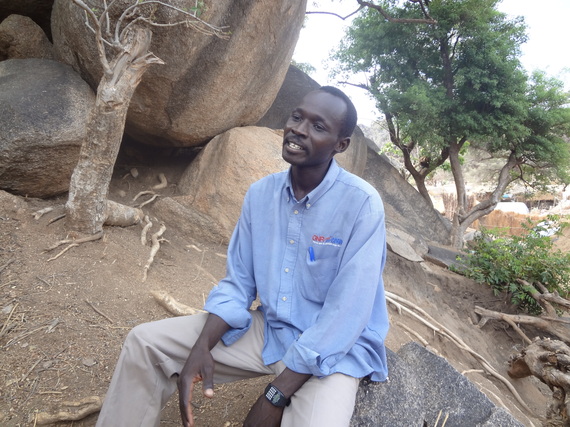
I was able to take Alfadil’s story, his words and his question, to the UN for meetings with Security Council representatives. And to make it very clear at every turn.
Alfadil and his family matter. Everyone matters.
Alfadil’s words cut to the very heart of the struggle for universal human rights. Governments have promised that everyone’s rights matter while betraying that promise every day. But millions of people speak out for human rights daily. Those efforts free prisoners of conscience, confront torture and push governments to tackle deep-seated problems that are at the heart of injustice and inequality.
It takes perseverance.
In 2004 Amnesty International launched our Stolen Sisters report, documenting the alarming levels of violence and discrimination against Indigenous women and girls in Canada; a human rights crisis by any measure. For more than a decade we have stood alongside the families of murdered and missing women, grassroots activists, Indigenous women leaders and others in pressing for a public inquiry and national action plan to address the violence. That call was widely supported across Canada and beyond our borders, but for years the federal government refused to take that step.
Our insistence never wavered. And now everything has changed.
Within six weeks of this fall’s election, the new government launched consultations – with families who are searching for answers about their daughters, sisters, aunts and cousins – about the best approach for a public inquiry, which should be underway later in 2016.
As I listened to the announcement I thought of the many Indigenous women I have been humbled to stand with over the past eleven years. Their pain has been raw. Their leadership has been inspiring. Their call for justice has been so clear.
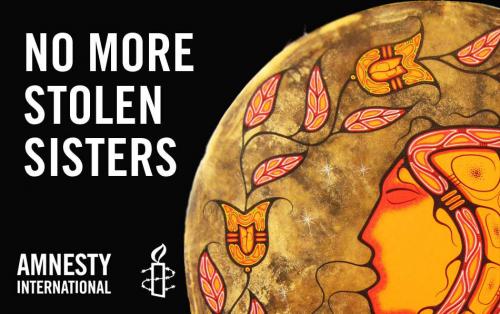
Everyone matters. Indigenous women and girls matter.
We may in fact stand at a remarkable crossroads with regard to the wider range of human rights concerns facing Indigenous peoples in Canada. The new government has promised a new relationship. They have committed to implementing the calls to action from the Truth and Reconciliation Commission. And they have underscored that the new relationship must lie in fully implementing the UN Declaration on the Rights of Indigenous Peoples, something Amnesty International has been calling for since it was adopted in 2007.
A concrete indication that the promise of a new relationship is real would be to halt construction of the Site C Dam in northern BC in the face of widespread opposition from affected First Nations.
Perseverance and breakthrough. Indigenous peoples matter.
Global efforts to end the devastating conflict in Syria have, to say the least, been a colossal failure. International action has been paralyzed by politics, arms have continued to flow into the region, and the brutality of the violence has intensified with the rise of ISIS.
For several years Amnesty International has pressed the world to at least take action where Security Council vetoes don’t block the way, by ensuring that the unending wave of Syrians who have fled the country – now more than 4 million – find safe and dignified refuge.
But the world looked away as the numbers of Syrian refugees mounted, conditions in neighbouring countries worsened and desperation forced more and more refugees to take deadly journeys across the Mediterranean.
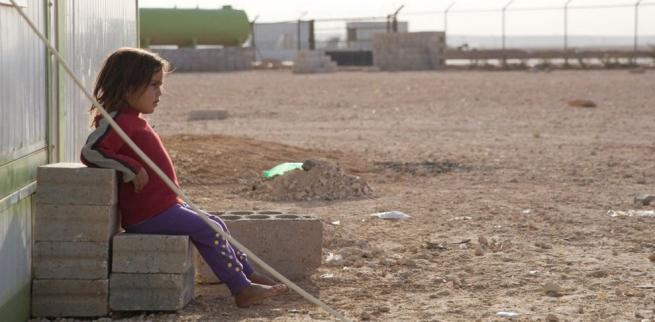
Canada dithered, made excuses and looked away. Joining with worried Syrian-Canadians, we pressed the government to do more. And when the heartbreaking photograph of 3 year-old Alan Kurdi’s lifeless body on a Turkish beach captured global attention, we insisted that indifference was no longer an option. It became a major election issue and the new government has come to power having made bold resettlement commitments.
How fitting that the first plane full of resettled Syrian refugees arrived in Toronto on December 10th, International Human Rights Day. And thousands more will follow.
Over the coming year we will launch a #RefugeesWelcomeHere campaign, shoring up the remarkable support for refugees Canadians have demonstrated in recent months and pressing for an end to the restrictive laws and policies that have taken hold in recent years.
Heartbreak and triumph. Syrian refugees matter. Every refugee matters.
Throughout 2015 Amnesty International supporters took action to free prisoners of conscience, end torture and protect human rights defenders.
The year began with the worrying news that imprisoned Saudi Arabian blogger, Raif Badawi, sentenced to 10 years in prison and 1,000 lashes over 20 weeks, was set to receive his first 50 lashes. Amnesty activists around the world – including in Canada, where his wife Ensaf Haidar and their three young children now live as refugees – rallied. The first fifty lashes did go ahead, but Raif Badawi has not been flogged again. International pressure has been considerable. Now we must ensure that he is freed.
Our Stop Torture campaign continued throughout 2015, with particular focus on Mexico, where we have said torture is ‘out of control’. During a Mexican prison visit in 2014 I interviewed Adrian Vázquez, who had been tortured so badly that he had almost died. We campaigned hard for justice for what Adrian had endured. And just three weeks ago he was indeed freed, reunited with his wife outside the prison walls that had held him captive for the past three years.
Remarkably Adrian’s release from prison was followed within 24 hours by the news that Cristel Piña had been freed. Cristel was also tortured in custody, including through sexual violence.
During that same 2014 mission to Mexico I interviewed another torture survivor, Angel Colon, a prisoner of conscience held in a maximum security prison for over five years. He was released five weeks after that visit.
Angel spoke to Amnesty supporters from across the country at our May 2015 AGM in Halifax. His courage and grace captivated every audience who heard him, including a House of Commons Committee. His words of encouragement have stayed with many: my freedom is your victory
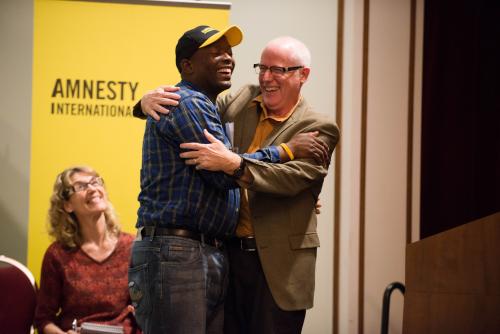
From Saudi Arabia to Mexico. Every individual wrongly imprisoned matters. Every person who has faced the agony of torture matters.
At the heart of everything we do are brave women, men and young people defending rights in their communities. Sadly in many parts of the world 2015 was not a safe year to be a human rights defender
We insisted that China relent in its crackdown on the country’s human rights lawyers. We celebrated the release from prison of Azerbaijani human rights activists Leyla and Arif Yunus, but demanded that all restrictions against them be lifted. We continued to press for freedom for Bahareh Hedayat and other women’s human rights defenders imprisoned in Iran.
We were thrilled to learn that Colombian Indigenous leader Flaminio Onogama has resumed his human rights work. Flaminio went into hiding in 2014 after two relatives were killed and he received death threats. Amnesty activists have been actively campaigning for his safety ever since.
We also stood alongside Cindy Blackstock, untiring advocate for the rights of First Nations children in Canada, as she exposed how she had been targeted for government surveillance and reprisals because of her human rights work.
Every defender of human rights matters.
There have been many troubled, global hotspots in 2015. We were on the ground researching terrifying human rights crises right around the world. In Syria, northern Iraq, the Central African Republic, Burundi, Ukraine, Yemen, Libya, Bahrain, Sudan and South Sudan, Amnesty teams have interviewed, probed and reported. We have taken our findings to national capitals and the UN. We have held rallies, organized vigils, written letters and circulated petitions. We have offered our solidarity.
Every woman, every man and every child matters, in times of peace and times of war.
As we begin 2016 we face new opportunities for advancing human rights in Canadian foreign policy and domestic record. Change is urgently needed after years of inaction with respect to a number of key concerns, including the rights of Indigenous peoples, ratifying UN treaties, corporate accountability, national security reforms, gender equality, and raising human rights consistently with other countries.
Our demands for change never faltered. And many of our concerns are now reflected in commitments from the new government, such as signing on to the UN Arms Trade Treaty, reversing refugee healthcare cuts and protecting the rights of transgender individuals. Now we await follow-through.
We have put all of our human rights recommendations in front of the government in our new report, Defending Rights for All: Amnesty International’s 2016 Human Rights Agenda for Canada. And we will continue to press, with renewed hope and expectation.
At the very heart of all of these efforts has been the determination and generosity of Amnesty supporters across the country. Be it the crucial financial support that makes our work possible or the energetic activism that drives change, Canadians show how deeply they care about human rights.
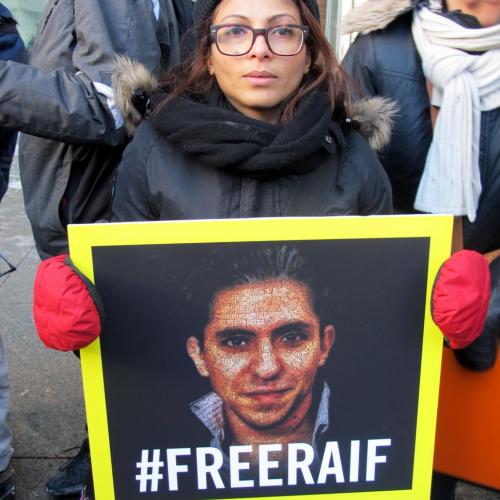
That was on display again this month in the splendid turn out for our annual Write for Rights campaign, part of a remarkable global letter-writing blitz that generates millions of letters worldwide.
Perseverance and breakthroughs.
Thank you for your support and your commitment to a world in which everyone matters.
Together we will continue to make a difference in 2016.























